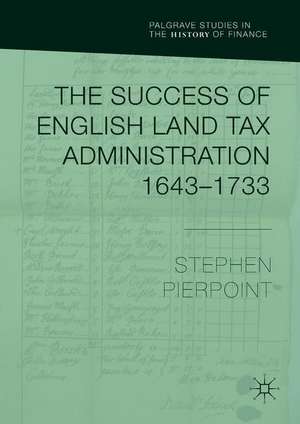The Success of English Land Tax Administration 1643–1733: Palgrave Studies in the History of Finance
Autor Stephen Pierpointen Limba Engleză Hardback – 3 aug 2018
| Toate formatele și edițiile | Preț | Express |
|---|---|---|
| Paperback (1) | 530.58 lei 43-57 zile | |
| Springer International Publishing – 19 ian 2019 | 530.58 lei 43-57 zile | |
| Hardback (1) | 711.89 lei 43-57 zile | |
| Springer International Publishing – 3 aug 2018 | 711.89 lei 43-57 zile |
Din seria Palgrave Studies in the History of Finance
-
 Preț: 362.11 lei
Preț: 362.11 lei - 9%
 Preț: 764.94 lei
Preț: 764.94 lei - 9%
 Preț: 626.30 lei
Preț: 626.30 lei - 18%
 Preț: 737.26 lei
Preț: 737.26 lei - 15%
 Preț: 522.89 lei
Preț: 522.89 lei -
 Preț: 451.65 lei
Preț: 451.65 lei - 15%
 Preț: 701.06 lei
Preț: 701.06 lei - 18%
 Preț: 726.37 lei
Preț: 726.37 lei - 15%
 Preț: 712.22 lei
Preț: 712.22 lei - 15%
 Preț: 530.25 lei
Preț: 530.25 lei - 18%
 Preț: 1114.21 lei
Preț: 1114.21 lei - 18%
 Preț: 1006.55 lei
Preț: 1006.55 lei - 18%
 Preț: 726.06 lei
Preț: 726.06 lei - 18%
 Preț: 786.84 lei
Preț: 786.84 lei - 18%
 Preț: 792.03 lei
Preț: 792.03 lei - 18%
 Preț: 724.94 lei
Preț: 724.94 lei - 15%
 Preț: 702.54 lei
Preț: 702.54 lei - 18%
 Preț: 723.69 lei
Preț: 723.69 lei -
 Preț: 388.72 lei
Preț: 388.72 lei - 15%
 Preț: 694.19 lei
Preț: 694.19 lei - 18%
 Preț: 782.72 lei
Preț: 782.72 lei - 15%
 Preț: 637.59 lei
Preț: 637.59 lei - 18%
 Preț: 1108.51 lei
Preț: 1108.51 lei - 9%
 Preț: 920.31 lei
Preț: 920.31 lei -
 Preț: 383.12 lei
Preț: 383.12 lei - 18%
 Preț: 891.33 lei
Preț: 891.33 lei - 18%
 Preț: 958.25 lei
Preț: 958.25 lei - 18%
 Preț: 1008.28 lei
Preț: 1008.28 lei -
 Preț: 445.88 lei
Preț: 445.88 lei - 18%
 Preț: 1113.58 lei
Preț: 1113.58 lei - 15%
 Preț: 646.75 lei
Preț: 646.75 lei - 15%
 Preț: 702.05 lei
Preț: 702.05 lei -
 Preț: 450.11 lei
Preț: 450.11 lei - 18%
 Preț: 794.39 lei
Preț: 794.39 lei - 18%
 Preț: 948.29 lei
Preț: 948.29 lei - 15%
 Preț: 697.97 lei
Preț: 697.97 lei - 18%
 Preț: 728.74 lei
Preț: 728.74 lei
Preț: 711.89 lei
Preț vechi: 837.52 lei
-15% Nou
Puncte Express: 1068
Preț estimativ în valută:
136.26€ • 148.06$ • 114.54£
136.26€ • 148.06$ • 114.54£
Carte tipărită la comandă
Livrare economică 21 aprilie-05 mai
Preluare comenzi: 021 569.72.76
Specificații
ISBN-13: 9783319902593
ISBN-10: 3319902598
Pagini: 323
Ilustrații: XXII, 400 p. 45 illus., 1 illus. in color.
Dimensiuni: 148 x 210 mm
Greutate: 0.84 kg
Ediția:1st ed. 2018
Editura: Springer International Publishing
Colecția Palgrave Macmillan
Seria Palgrave Studies in the History of Finance
Locul publicării:Cham, Switzerland
ISBN-10: 3319902598
Pagini: 323
Ilustrații: XXII, 400 p. 45 illus., 1 illus. in color.
Dimensiuni: 148 x 210 mm
Greutate: 0.84 kg
Ediția:1st ed. 2018
Editura: Springer International Publishing
Colecția Palgrave Macmillan
Seria Palgrave Studies in the History of Finance
Locul publicării:Cham, Switzerland
Cuprins
Chapter 1: Introduction.- Chapter 2: Legislation for a New Tax on Land.- Chapter 3: Fiscal innovation and Local Response 1643-1680.- Chapter 4: After the Glorious Revolution.- Chapter 5: Four Detailed Examples of Post-Revolutionary Administrative Improvement and Resilience.- Chapter 6: Conclusion.
Notă biografică
Stephen Pierpoint is a former tax manager in the oil industry and tax inspector. He is currently an Honorary Research Associate affiliated to the Bartlett School, University College London. His current book is based on his Cambridge PhD thesis, but he has wide interests and has also written on the British Neolithic and Bronze Age.
Textul de pe ultima copertă
This book provides a thorough review of early English land taxes of the seventeenth and early eighteenth centuries. It is a polemical work which is critical of the institutional English state narratives including Brewer’s ‘Sinews of Power’ and North and Weingast’s ‘credible commitment’ and some established works in the field particularly Ward’s ‘The English Land Tax in the Eighteenth-Century’ which is subject to a highly detailed critique. The book proposes that although this was a time of tension, with an English population divided by political and religious affiliations, unprecedented amounts of taxation were still collected. This was achieved by ceding immediate process ownership to local governors whilst arming them with clear success criteria, well-designed processes and innovative legislation targeted on a growing and commercialized economy. An important development was the state’s increasing ability to coordinate tax-gathering activities across the country. This book will be of interest to financial historians, academics, and researchers.
Caracteristici
Attempts to rehabilitate land taxes in the growth of the English state Describes the distinctive response to parliamentary legislation in the three case study areas Challenges the judgment that the period after the Revolution is one of administrative decline for land taxes Highlights the remarkable consistency of tax revenue flows in early eighteenth-century London and the importance of biannual financial cycles to the fiscal process
